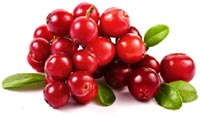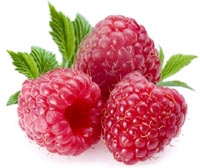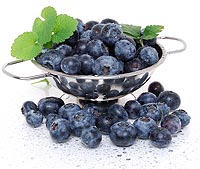| Home A B C D E F G H I J K L M N O P Q R S T U V W X Y Z |
|
Home |
The Health Benefits of Fruit
While you probably know that fruit is good for you, you may not realize just how far-reaching the health benefits of fruit can be. Fruit and vegetables are the ultimate body protection and performance foods. If you want to live a long and healthy life, upping your fruit and vegetable intake could be one of the best changes you make to your diet. Fruits are rich in:
Eating plenty of fruit and vegetables has been shown to:
Itís true that all fruits are good for you, but there are a few which offer some specific and quite impactful health benefits. You may already know about some of them, but others may surprise you! Letís take a look at these special fruits offering the most bang for your buck: 1. Cranberries Cranberries do more than help prevent urinary tract infections. There is evidence that the anti-bacterial chemicals they contain can help prevent gum disease and tooth decay and their antioxidant action may help to raise levels of HDL, the good cholesterol that can help maintain healthy arteries. Cranberries are rich in flavonoids. These phytonutrients have been shown to inhibit certain types of cancer. Polyphenolic compounds found in cranberry may help to protect against neurodegenerative diseases, and the memory and coordination losses often associated with aging. 2. Raspberries 
Raspberries come in various colors. Although primarily red, raspberries may also be black, purple and even golden. There are over 200 known species of raspberries, and interestingly enough, raspberries form part of the rose or Rosaceae family, together with strawberries. There are two types of raspberries that are commercially available, the wild type summer bearing and the double or ever bearing plants. Raspberries are rich in vitamin C and may contain potential anti-cancer agents. Raspberries have also been linked to a positive promotion in cardiovascular health and cancer. A study published in the Journal of BioFactors reported that raspberries contain almost 50% more antioxidant activity than strawberries. These antioxidants have been shown to fight off cancer cells. 3. Apples Apples are not bursting with vitamins and minerals like other fruits, though they do provide a bit of vitamin C and potassium. However, without a doubt apples are amazing for controlling blood sugar, says Dr. Barry Sears in his book The Top 100 Zone Foods. ďApples are a good source of soluble fiber, especially pectin, which helps control insulin levels by slowing the release of sugar into your bloodstream. Pectin also helps reduce cholesterol levels by lowering insulin secretion.Ē We now also know that apples fairly shine in antioxidant phytochemicals; the principal ones identified so far are phenolics and the flavonoid quercetin. Quercetin is a powerful antioxidant, a natural anti-histamine, and anti-inflammatory. Studies have shown that quercetin reduces cancer risk of prostate, ovary, breast, gastric and colon cells. Donít peel your apples, as quercetin is found only in the skin. 4. Pineapple Pineapple, Ananas comosus, belongs to the Bromeliaceae family, from which one of its most important health promoting compounds, the enzyme bromelain, was named. Bromelain is a mix of enzymes which has been shown to lessen inflammation and reduce certain types of swelling. Pineapple is also an excellent source of the trace mineral manganese, which is an essential cofactor in a number of enzymes important in energy production and antioxidant defenses. In addition to manganese, pineapple is an excellent source of vitamin C and a good source of vitamin B1, copper, dietary fiber and vitamin B6. Among the many benefits of vitamin B1 is its ability to increase blood circulation and provide a greater supply of oxygen to the blood cells. In addition, vitamin B1 is known to help with the proper metabolism of carbohydrates, making it vital to good digestion. 5. Blueberries 
Scientists at the U.S. Department of Agriculture Human Nutrition Center have found that blueberries rank No. 1 in antioxidant benefits, compared to 40 other fresh fruits and vegetables. Antioxidants help neutralize harmful ďfree radicalsĒ that can lead to cancer and other age-related diseases. The total antioxidant capacity of blueberries (24 mcgmol Trolox equivalents per gram) is twice that of spinach and three times that of oranges. This extraordinary fruit is also rich in pectin. Blueberries are available year-round in many forms including fresh, frozen, juice, puree, concentrate, and dried. Fresh blueberries are higher in vitamins A and C than frozen or canned. A cup of blueberries provides nearly a third of the RDA for vitamin C. It would appear that most of the vitamin C is lost as a result of freezing and canning. 6. Strawberries A strawberry is a superstar when it comes to antioxidant power, says Dr. Barry Sears. In addition, 1 cup of strawberries gives you a whopping 140% of your RDA of vitamin C. Strawberries are also packed with flavonoids, two in particular, called quercetin and kaempferol. Research shows that these two flavonoids help keep bad cholesterol (LDL) from oxidizing and damaging artery walls. Strawberries also contain ellagic acid, which acts as a scavenger to ďbindĒ cancer-causing chemicals, making them inactive. It inhibits the ability of other chemicals to cause mutations in bacteria. In addition, it prevents binding of carcinogens to DNA and reduces the incidence of cancer in cultured human cells exposed to carcinogens. Select strawberries that have a full red color and avoid any that are uncolored or white. 7. Bananas The banana is a tropical fruit, a large berry thatís handy and healthy, providing 452 milligrams of potassium, 33 milligrams of magnesium, and just over 2 grams of fiber. Studies have shown that people with high levels of potassium in their diet have a lower incidence of hypertension, even if they donít watch their salt intake. The banana shares many benefits of its fruity brethren: Itís low in calories, fat, sodium, and much of its fiber is soluble — the kind that can help lower cholesterol. It stands out, however, because it has lots of potassium and a respectable amount of magnesium. Thatís why itís a favorite fruit of most athletes and often is recommended for people with diarrhea or high blood pressure. Bananas are also a very good source of vitamin B6, providing one-third of the RDA in a single serving. |
|
|
|
|
|
Glossary References Links Contact
|